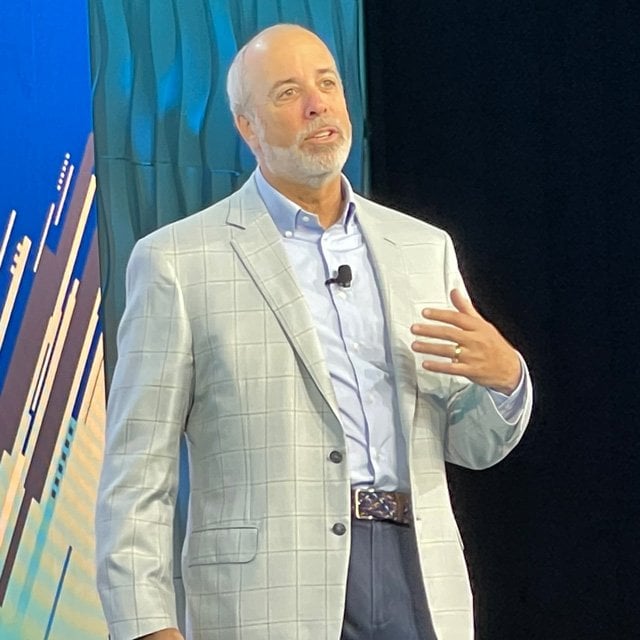Ric Edelman: Crypto Needs 'Adult Supervision'

“We need adult supervision in the room, companies like Fidelity, which runs Fidelity Digital Assets, companies that have pristine reputations, that are being run by serious professionals who are well-versed in compliance and legal and risk management, who can provide the necessary oversight, to help protect a company from its own arrogant founder,” Edelman said.
Edelman cited a Coindesk article that quoted an anonymous source as saying FTX had been run by “a gang of kids in the Bahamas.”
“I’m hoping that this is an opportunity for the adults in the financial services industry to step up and to basically say to the crypto gang that launched all of this over the past decade, ‘It’s time for you all to pack your bags and get out of the way,’” Edelman said.
“They now have serious money from millions and millions of investors … we have major pension funds investing,” Edelman said. “It isn’t just a game anymore, it isn’t just a toy anymore,” he said. “I’m hoping that the adults step up and contribute in a way that to date maybe they haven’t.”
Edelman and Hougan predicted that FTX’s unraveling will catalyze regulators and legislators to quickly and aggressively bring new regulatory scrutiny to crypto, with harsher legislation than the currently pending bills. They agreed that regulation would be a silver lining to the FTX collapse and placed some blame on regulators for moving too slowly.
“Crypto deserves it,” Hougan said. “It needs to go through this period of fire.”
Edelman called it “ridiculous that the regulators and legislators in Washington haven’t figured this out yet, and so they’re going to be a little bit embarrassed that on their watch the lack of regulatory environment allowed this kind of company to engage in this kind of behavior for so many years.”
Among Edelman and Hougan’s other views on the crypto disaster:
“Everyone was blindsided by this,” Edelman said.
In retrospect, there were many red flags, Hougan said. These included FTX’s headquarters in the Bahamas; Bankman-Fried’s parallel hedge fund (Alameda) that traded on the FTX exchange and generated “incredible profits;” celebrity backers; a sports arena sponsorship; and lack of a real board, corporate governance or organizational supervision, he said.
That lack of oversight happened despite FTX having major venture backers from traditional finance, Hougan noted. The company attracted funding during the 2020-21 bull market and “many people just wanted to make sure they had a bet on crypto and SBF was on the cover of Fortune and Forbes,” he said. “This is not the first time in the financial industry that we’ve seen a meteoric star rise and attract investor attention and investor capital without doing the due diligence.”
Edelman recommended investors “treat crypto the same way that you treat stocks.” Most financial advisors have clients buy funds handled by a fund manager rather than holding individual stocks. “Why buy on your own?” he asked. “You don’t do it in the stock market, why do it in the crypto market?”
When considering where to hold digital assets, don’t judge a company by its slick ads, Hougan said, citing FTX’s Super Bowl commercial starring Larry David. “That is not a reason to choose a platform to custody your assets with,” he said.
In addition to Bitwise, Hougan cited what he considers responsible crypto companies: Coinbase, Circle and Anchorage.
Some crypto investors may want to keep custody of their assets themselves, Hougan said, but they can also use custody services from Fidelity, BNY Mellon or Coinbase, he noted.
FTX account holders will wait years to get their hands on any remaining money as the company’s bankruptcy winds through the courts, Hougan predicted.
Hougan doesn’t think the collapse will change crypto’s destination but expects it will take many months, or longer, for the system to heal and for investors to feel comfortable enough to tiptoe back to the market. The collapse keeps investors who otherwise would be attracted at these prices on the sidelines, he said. “It’s going to be a volatile stretch toward the end of the year,” and could be accelerated by tax-loss harvesting, Hougan said.
Hougan sees three phases to recovering from the FTX collapse: Seeing if other crypto companies become insolvent or file for bankruptcy protection in the next few months; development of new regulations; and development of new crypto apps, which he described as the fruits of engineers’ labor and venture capital money. While people are caught up in the FTX situation, recent activity in the crypto industry is “laying the groundwork for a great bull market at the end of the tunnel,” Hougan said.




